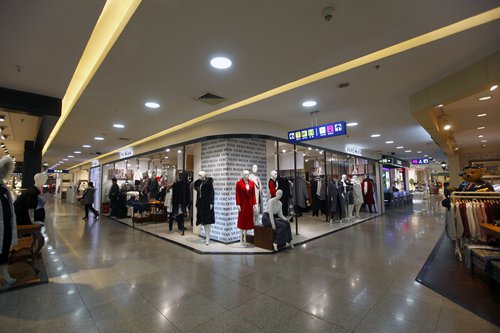
Many traditional department stores along Nanjing Road must transform and upgrade in order to cater to the new demands of younger customers and to compete with e-retailers. (Photos: Yang Hui/GT)
In contrast with the growth of online retailers, physical stores in China are closing at an equally rapid rate due to declining sales, rising rent and far less foot traffic. Shanghai's Pacific Department Store on Huaihai Road Middle, the latest brick-and-mortar casualty, will reportedly close at the end of this year after the expiration of its 20-year lease. The iconic establishment first opened in 1997, the start of Shanghai's "glory days" for department stores. But with Pacific's newly announced Bye-bye Sale, many local residents are realizing that this truly is the end of days for window shopping.
Pacific Department Store occupied eight floors in Shui On Plaza. Once it closes this December, however, its venue will be taken over by Xintiandi Shanghai, a developer of local premium commercial properties, thepaper.cn reported.
Zhang Liangjun, a project manager at Xintiandi China, told a local news agency that Xintiandi's target customers are post-1990 generation adults and white-collar workers.
The new shopping mall, which will open at the end of 2018, will focus less on the older shoppers that Pacific catered to.
Some other department stores and shops along Huaihai Road have also recently closed, with some simply going out of business and a few going through renovations and upgrades in an attempt to attract younger generations of foot traffic.
Shanghai's most famous commercial pedestrian street is, of course, Nanjing Road, which includes the touristic Nanjing Road East and the broader Nanjing Road West.
A spokesperson from the Commission of Commerce in Huangpu district told thepaper.cn that many historical department stores along Nanjing Road, such as Shanghai New World Emporium and Shanghai No.1 Department Store, will be transformed in 2017.
Retail pioneers
Half a century ago, department stores on Nanjing Road were literal pioneers among their retail counterparts in Asia. Many innovative practices that were eventually adopted by the entire Asian retail industry were first put into practice along Nanjing Road.
Equipping department stores with escalators and central air-conditioning systems, for example, and introducing restaurants and theaters into shopping malls, were all first seen on Nanjing Road long before Tokyo, Hong Kong, Seoul and Singapore followed suit.
At one point, Shanghai No.1 Department Store was considered the city's most high-end shopping mall. Everyone who was anyone went there to be seen buying new clothes, with the actual transaction quite a ceremonious moment.
The department store is located at the intersection of Nanjing Road East and Xizang Road Middle, still the most high-volume location for foot traffic in all of Shanghai.
Wang Xiaoyan, deputy general manager of Bailian Group, a State-owned enterprise in Shanghai, oversees many local department stores, shopping malls, outlets, supermarkets and convenience stores. Wang pointed out that Shanghai's department store industry is currently at a "saturation point" following 10 years of explosive growth.
Saturation point
According to Wang, products sold in Shanghai department stores used to be limited and exclusive, and as long as local physical stores offered high-quality products at fair prices, these stores could maintain a loyal customer base.
"But with rising consumption levels, local customers have changed their previous shopping habits, now expecting more diverse selections and a more entertaining shopping experience. Older department stores can no longer meet those needs," Wang said.
Wang added that the products and brands currently being sold at local shopping malls are now all quite similar if not the exact same, which has resulted in even more fierce competition among malls to keep prices low, which hurts everyone's bottom line.
The city's rising labor costs and skyrocketing rent have also raised overall operational costs for department stores.
But most importantly and most detrimental, the emergence and surging popularity of online e-retailing platforms has posed huge challenges to physical stores in Shanghai and across China.
Transform and enhance
To cater to these new demands and compete with e-retailers, Bailian Group will "transform and enhance" many of its traditional department stores along Nanjing Road, in order to give them their own unique character and personality.
As a protected historical building, the exterior design of Shanghai No.1 Department Store may not be altered in any way.
However, the interior of the store can, which will become attached to an adjacent shopping mall with connective corridors. Bailian Group has invited an internationally recognized design company to renovate its interior.
More dining and entertaining services will also be introduced into the department store, such as an international food market, experiential bookstore and movie theater. Staple products previously sold at the department store will be replaced for merchandise that appeals to tastes of young people.
Likewise, another historical department store on Nanjing Road, Shanghai Wing On Department Store, which has 98 years of history, will also renovate its interior. While the mall's exterior must maintain its original historical style, its inside layout will be revamped by international designers. It will thus celebrate its 100-year anniversary following the transformation.
It is noteworthy that the Huangpu district government also plans to improve the customer experience of its many traditional department stores.
Chen Yong, an official from the Commission of Commerce in Huangpu, said that the district government will work closely with physical stores as well as law firms to establish "comprehensive antecedent compensation mechanisms."
This means that those physical stores will finally be forced to respond to customer complaints more promptly, something severely lacking in the old business models of these time-honored shopping venues, where "the customer is always right" rule has never applied.
Chen pointed out that the district government cares much about the product quality and service standards of its physical stores and will work closely with them, including hiring investigative organizations to secretly monitor the stores, to ensure that local customers start to enjoy higher-quality products and more considerate service.


















































